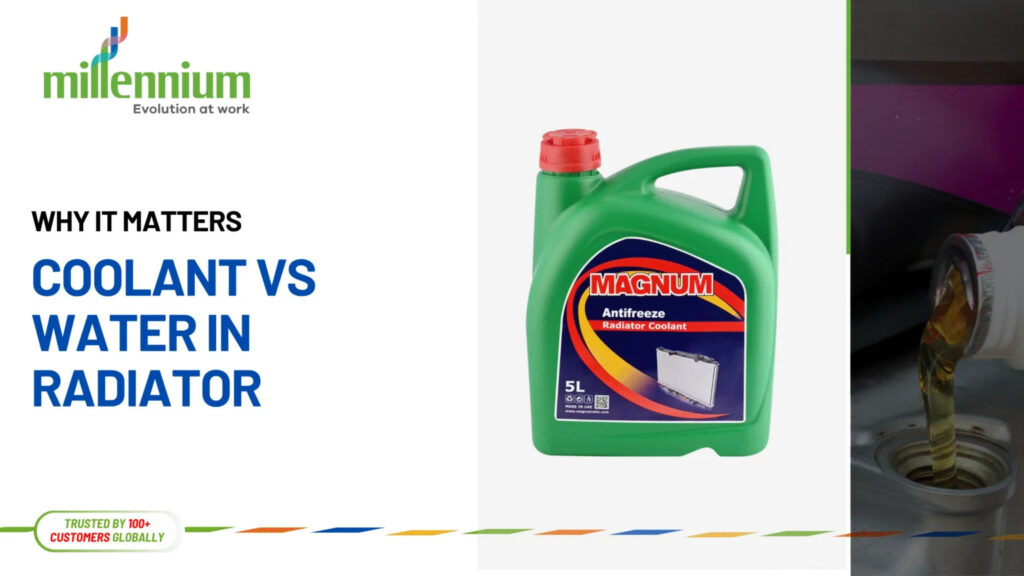
Introduction
Your car’s engine works hard every time you drive, generating immense amounts of heat. To prevent overheating, the cooling system plays a crucial role, with the radiator being its heart. But what you put inside the radiator—coolant or plain water—can determine your engine’s long-term health and performance. Many drivers mistakenly believe water is a sufficient substitute for coolant, but while it may work temporarily, it comes with significant risks. This article explores why coolant is essential, why water alone isn’t enough, and what long-term impact your choice can have on your vehicle.
Role of Coolant
Coolant, often called antifreeze, is a specialized liquid designed to regulate engine temperature under all conditions. It is typically a mixture of water, ethylene glycol or propylene glycol, and corrosion inhibitors. This blend gives coolant several unique properties:
-
Temperature regulation: Coolant raises the boiling point and lowers the freezing point of the liquid inside the radiator. This ensures the engine doesn’t overheat in summer or freeze in winter.
-
Corrosion prevention: Additives in coolant form a protective layer on metal surfaces, preventing rust and scaling inside the radiator, water pump, and engine block.
-
Lubrication: Coolant also lubricates critical components such as the water pump, reducing wear and extending their lifespan.
-
Consistency: Unlike plain water, coolant maintains stable performance across a wide range of temperatures.
In short, coolant isn’t just about keeping your engine cool—it’s about protecting the entire cooling system and ensuring long-term reliability.
Why Water Isn’t Enough
Water is often seen as a quick fix because it is cheap, widely available, and has excellent heat-transfer capabilities. While it can temporarily cool your engine, relying solely on water in the radiator can lead to serious problems:
-
Boiling and freezing risks: Pure water boils at 100°C and freezes at 0°C. In high-heat or cold climates, this can quickly cause overheating or frozen coolant passages.
-
Corrosion and rust: Water alone encourages rust formation inside the radiator and engine. This corrosion can clog passages, damage the pump, and weaken the radiator over time.
-
Mineral deposits: Tap water contains minerals like calcium and magnesium, which form deposits (scale) inside the cooling system. These deposits reduce efficiency and lead to blockages.
-
No lubrication: Water lacks the lubricating properties of coolant, putting extra stress on the water pump and other moving parts.
Thus, while water can work in emergencies or short trips, it cannot be relied on for long-term use without damaging consequences.
Coolant vs Water Radiator Diagram
(Illustration Description – can be designed for article)
A simple diagram can visually highlight the differences:
-
Left Side (Water in Radiator):
-
Temperature range: 0°C to 100°C
-
Risks: Freezing, boiling, corrosion, mineral deposits
-
No lubrication properties
-
-
Right Side (Coolant in Radiator):
-
Temperature range: -37°C to +129°C (typical for 50/50 mix)
-
Protection: Anti-freeze, anti-boil, anti-corrosion
-
Added benefits: Lubrication, long-term engine protection
-
This side-by-side comparison clearly shows that coolant is engineered for efficiency and durability, whereas water provides only short-term cooling.
Long-Term Impact
Using the wrong liquid in your radiator can have far-reaching consequences for your vehicle:
-
Overheating damage: Without coolant’s higher boiling point, water-only systems overheat easily, leading to blown gaskets, warped cylinder heads, or even complete engine failure.
-
Corrosion buildup: Over time, rust and mineral deposits reduce cooling efficiency, making overheating even more likely and requiring expensive repairs.
-
Component wear: Lack of lubrication from plain water shortens the life of pumps, hoses, and seals, leading to frequent replacements.
-
Reduced resale value: A poorly maintained cooling system leaves long-term damage that lowers the resale value of your car.
On the other hand, using the correct coolant mixture (usually 50% coolant and 50% distilled water) ensures optimal performance and significantly extends the life of your engine and radiator.
Summary
The debate between coolant and water in a radiator isn’t really a debate at all—coolant is the clear winner. While water may temporarily cool an engine, it cannot protect against freezing, overheating, corrosion, or wear. Coolant, with its specialized additives and properties, ensures your engine runs efficiently in all weather conditions, prevents costly damage, and prolongs the life of your vehicle.
In conclusion, always use the manufacturer-recommended coolant mixture for your car. Think of it as a small investment that saves you from bigger repair bills and ensures your vehicle performs reliably for years to come.



